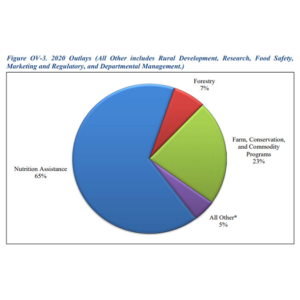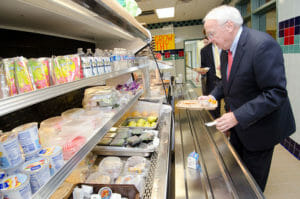This blog post was written by Arizona State University graduate student Joe Snowaert. In addition to studying Food Policy and Sustainability Leadership at ASU, is a FoodCorps alum who now works as is a salad bar educator with Fairfax County Public Schools Food and Nutrition Services Office.
During our week-long immersion trip to Washington DC, we had the pleasure of meeting with Kevin Concannon, a man with an incredible history of public service, and who most recently served for nearly eight years as President Obama’s USDA Under Secretary of Food, Nutrition, and Consumer Services.
When most folks think of the USDA they think of agriculture and farms, which is understandable given the Department’s name. Yet the USDA Food Nutrition Service (FNS) accounts for most of the USDA budget and with it, the agency provides critical lifelines to millions of Americans across the country. FNS operates 15 nutrition programs including: National School Lunch Program (NSLP), Supplemental Nutrition Assistance Program (SNAP), Special Supplemental Assistance Program for Women, Infants, and Children (WIC), Summer Food Service Program (SFSP), and Food Distribution Program on Indian Reservations (FDIPR). Many of these programs have been in the headlines during the COVID-19 pandemic because of escalating food insecurity due to rising unemployment and school closures.
Mr. Concannon emphasized the importance of FNS being accessible to all who need the services. He was happy to see the USDA provide some program flexibilities during the pandemic, such as allowing use of SNAP for home delivery of groceries. He also described the economic stimulus role of SNAP – every spent dollar of SNAP generates $1.74 in economic activity. By multiplying that impact figure by the nearly $60 million in SNAP benefits in 2019, it became clear that SNAP is a large stimulus to local economies.
SNAP needs to be approachable for all participants, Mr. Concannon emphasized. While Under Secretary he advocated for ways to allow SNAP recipients to use their benefits without suffering negative stigma in accepting help. He encouraged us to spread the word that if individuals are eligible, they should apply for SNAP. As we learned in our budget class, SNAP is a mandatory program so one family receiving benefits does not take away from another.
During his time with the USDA, 100,000 schools were operating the NSLP serving 30 million meals per day, with 21 million of those meals reimbursed at the free and reduced rate (the other 9 million meals are reimbursed at a lower rate). He described the program as under attack because of its upgraded nutrition standards, which is ironic given that NSLP was started as a national security measure to protect the health and wellbeing of children. Another program focused on feeding those under 18 is the SFSP which normally operates during the summer months and has 80,000 summer meal programs serving 3 million children. This same program is now being operated by food service providers across the country to ensure children 18 and under are fed during the pandemic.
Kevin Concannon has dedicated his career to helping those in need. Despite his many accomplishments, he remains a humble person who speaks with passion about the importance of public service. It was a true honor for our group to meet with this great leader.
On behalf of the entire ASU Food Policy and Sustainability Cohort, we would like to extend our sincere appreciation to Kevin Concannon for taking the time to meet with us and for his years of service on behalf of the public good.

